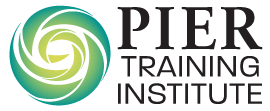The Peer Support Fidelity and Integration training offers tangible strategies and logistical support in developing transformative programs. This training will outline practices related to the integration and/or strengthening of peer support roles in clinical and nonclinical settings.
Peer support has been empirically and anecdotally proven to be a powerful force that offers support to people navigating a myriad of challenges and circumstances in our communities. This evidence has led to the proliferation of these critical peer support positions in a variety of settings; yet, there has not been equal focus on exactly “how” to integrate and build programs with peer supporters. This training dives deep into the vital elements of building a successful and impactful program with peer supporters where teams can develop the skills to effectively assess and transform their program’s health through the lens of peer support fidelity. These elements include: supervision, team meetings, communication, documentation, training, and strategies that strengthen all roles on the team and, ultimately, improve the outcomes and experiences of those utilizing services in the mental health system. This model is designed upon the values of mutual empowerment, authenticity, and orientation to community.
PTI trainers have experience and training in various peer support models, (e.g. Intentional Peer Support and CCAR Recovery Coaching) and have successfully applied these models in a variety of settings, including emergency departments, early-intervention programs, primary care, behavioral health clinics, and standalone peer-run programs, among others. These programs have demonstrated positive outcomes for program participants, as their senses of hope, meaning, and connection to others and their communities have increased.
The Peer Support Fidelity and Integration is a 16-hour training. The training is interactive and activities-focused, with ample time for discussions and questions. The training can be adapted to the specific needs of the site.
Training Outcomes:
Participants will gain knowledge and skills in:
- Understanding Peer Support Model(s) and its history as a social movement
- Developing a supervision model that effectively supports peer supporters
- Developing a team structure and communication standards in alignment with peer support fidelity
- Understanding the nuances of peer support documentation, if applicable to the setting
- Implementing effective training opportunities for role clarity and team collaboration
- Developing effective team cultures that include the voices of people with lived experience
- Identifying critical integration steps for new peer support roles and programs, if applicable
- Putting it all together: How designing programs with fidelity to peer support models drives transformative team dynamics, improves participant experience, and increases community collaboration
TIME: 16 hours training time
Post-Training Technical Assistance:
The training team offers post-training technical assistance for as long as the site needs. This is most commonly outlined as:
Timeframe: 1 to 2 years
Frequency: 1-2 hours a month
The initial training supports teams to implement/strengthen outlined components. Ongoing technical assistance is encouraged, as teams often struggle with navigating complex ethical situations, supervision, complicated team dynamics, regulatory or bureaucratic challenges, among many others. One of our esteemed colleagues likes to say “if there aren’t uncomfortable bumps occurring, integration is probably not happening with fidelity.”
Learn about PIER Model Family Psychoeducation Training & Certification.
